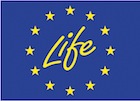Baltic pilot cases on reduction of emissions by substitution of hazardous chemicals and resource efficiency (LIFE FitForREACH)
The environmental problem targeted by the project is the fact that hazardous substances reach the environment, disturb ecosystem functions, have endocrine effects, accumulate and reach the human food chain so that they are found in breast milk etc. Although effects are known, the concerned substances are still in use and emitted by the industry. Regulations seem to have too little effects, although they are in place and prioritize substances of very high concern (SVHC). REACH places high responsibility for chemicals management on industry and has led to a greater awareness about hazardous substances. However, many emitters downstream of supply chain are very small companies using substances and mixtures in production processes and often unaware of what they contain. They cannot afford complex authorization procedures and lack the knowledge, skills and funds to find alternative substances. We therefore offer downstream user SMEs a full “chemicals management package” inluding: capacity building on CLP/MSDS literacy, information on chemicals inventories and general management practices, guidance how to follow legal obligations on specific substances (SVHC) and proposals on how to implement substitution as a core action to reduce environmental impacts from the use of chemicals in their own products and processes, possibly also realising resource efficiency gains. Substitution will be used as an entry point to companies and as “pilot cases” to illustrate all elements of a chemicals management at SMEs, including the assessment of alternatives, socioeconomic evaluation and an analysis of the social motivation for substitution. We want to prepare downstream user SMEs to face the future challenges for chemicals management, which means to understand the restrictions of tomorrow already today: sunset dates of various substances beyond 2019, active participation in the authorization process, complying with obligations set in WFD until 2020 etc. We want to make Baltic SMEs “Fit for REACH”. The pilot aspects of the project will be its full chemicals management package, the relation to resource efficiency, the illustration of actions and effects, all which lead to a “methodological blueprint” for SMEs on substitution. We want to demonstrate that substitution pays off economically and for the environment, to show that (socio)economic analysis is feasible, can be “simple” and still be a useful decision aid. Moreover, we want to demonstrate successful substitution cases.
Project results
- The project will result in minimizing the exposure to hazardous substances. 6 in‐depth and 50‐80 light substitution cases will have been implemented and become perfect examples of good chemicals management.
- 50% of the target SMEs in EE (250), LV (300) and LT (400) is informed about the project. A smaller group (10%) will have expressed interest in cooperation and concluded cooperation agreements, leading to further reduction of HS.
- Guidelines for a hazardous substances free procurement will have been elaborated and tested by 5‐6 companies. The guidelines will enable SMEs to improve their internal procurement system and to acquire raw materials and auxiliary products with less HS. A set of recommendations on how to optimize implementation and enforcement of REACH at SMEs will have been elaborated addressing competent authorities at i) ministerial level and ii) executive agency level.
- The web platform and its tools will have been recognized by at least 25% of the stakeholders (industry & authorities), the tools provided an effective assistance in the identification and management of chemicals.
- Sodium percarbonate emissions are reduced by 40 tonnes, sodium perborate by 37 tonnes, nonylphenol by 0,5 tonnes, phenylmetanol by 8 tonnnes, organotin compounds-by 0,175 tonnes, Bisphenol A by 0,11 tonnes, lead oxide by 6 tonnes and of environmentally hazardous VOCs‐by 80 tonnes.
- The motivation of stakeholders to take decision for or against substitution will have been analysed as well as consumers’ attitudes towards hazardous substances, greener products and production lines. This information will stimulate the pilot companies to undertake more actions as they will better understand the needs of the consumers and the market demand. SMEs will have more skills and tools to use their substitution success for marketing.
- Substitution cases from Baltic States published at SUBSPORT will encourage other CEE countries to strive for more substitution in their industries.
Partners
Baltic Environmental Forum Estonia (Project coordinator)
Baltic Environmental Forum Lithuania
Baltic Environmental Forum Latvia
KTU Institute of Environmental Engineering (APINI)
Chemicals and industrial pollution
Contacts
Audrone Alijosiute
Environmental Expert
Tel. +370 5 215 9288
E-mail: Audrone.Alijosiute[at]bef[dot]lt
Website
Duration
09/2015 –02/2020
Support
LIFE programme and project partners. Project No. LIFE14ENV/LV000174





